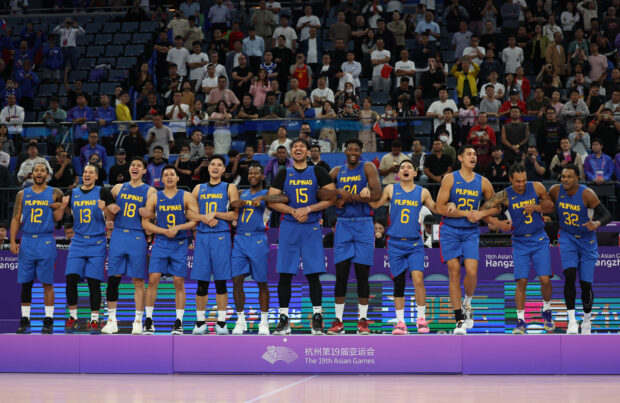
Gilas Pilipinas members celebrate with their gold medals after defeating Jordan in their men’s basketball gold medal at the 19th Asian Games in Hangzhou, China, Friday, Oct. 6, 2023. REUTERS/Marko Djurica
Why read the analytical articles and thought pieces or listen to podcasts to understand how Gilas Pilipinas—barely having enough players and practice time together—delivered the country’s first Asian Games basketball gold in over half a decade?
Tim Cone is more than willing to give everyone the answer.
“Mostly, I thought it was [the team’s] veteran presence,” the victorious national coach told the Inquirer. “All the players were past trying to make a name for themselves and were just truly focused on winning as a team.”
“They were willing to just put one foot in front of the other and battle through any adversity we faced—and Lord knows we had our share of adversity. As it turned out, it was a team of grit. That kind of veteran attitude can make all the difference in the world,” he added.
The national squad will be honored during the Philippine Sportswriters Association Awards Night later this month with the President’s Award for the team’s Asian Games gold medal, which it won by beating continental rival China in the semifinals and Jordan in the finals.
Back in September, Cone told the Inquirer that he felt many were viewing the team “as lambs being led to slaughter.” That assessment seemed too kind at that time: The Samahang Basketbol ng Pilipinas (SBP) struggled to come up with a definite plan for the Hangzhou, China, showcase after an underwhelming Fiba (International Basketball Federation) World Cup homestand.
The team was without a coach, and nearly half of the players who competed in the global meet bolted the squad to fulfill their club duties. Cone was appointed as a stop-gap measure, but manpower woes persisted days before the delegation was scheduled to leave.
Fortuitous
Tim Cone reacts during the gold medal game between the Philippines and Jordan. —REUTERS
In China, Gilas barely survived its opponents, figuring in a nasty end of a group-phase whipping from Jordan, which put the Filipinos on a more precarious route to the gold medal.
But that change in course seemed fortuitous, as it sent the Philippines into a semifinal duel against the hosts who were eager to avenge an embarrassing loss during the World Cup. China looked primed to advance to the finalé. But once again—like in many earlier tours—Justin Brownlee came through for Gilas.
In the return match against the Falcons, the naturalized ace got even more help. June Mar Fajardo, Scottie Thompson, CJ Perez and Kevin Alas hit timely shots to quench an Asiad gold medal drought that had spanned 61 years.
That triumph, which Chris Ross, Marcio Lassiter, Ange Kouame, Chris Newsome, Calvin Oftana, Arvin Tolentino and Japeth Aguilar helped deliver, will surely be talked about until the next one comes along.
Cone is aware of the expectations birthed by such a monumental milestone. And he understands the people’s clamor for sustained excellence.
We are passionate about our basketball and that kind of passion should somehow translate to eventual success. I think that is a reasonable expectation of Philippine basketball fans,” he said.
“It’s true that we won’t beat everyone and that there are teams out there that could, at times, beat us up, but it’s also a reasonable expectation that we be competitive in our backyard in Asia,” he pointed out.
“We shouldn’t have to wait for another 60 years to have some kind of success at the international level.”
As things stand, the country’s basketball leaders have yet to lay down its plans moving forward. Cone has since sat down with them but only to provide his insights.
At the heart of it all, Cone said that it is imperative that the Philippines sends its best players.
But that’s only a first step.
“To me, it’s always about continuity and getting the best 12 players in the county to commit to the program,” Cone said. “To secure that also takes a lot of commitment from all the stakeholders around the basketball community.”
“Needless to say, that’s not a simple thing.”